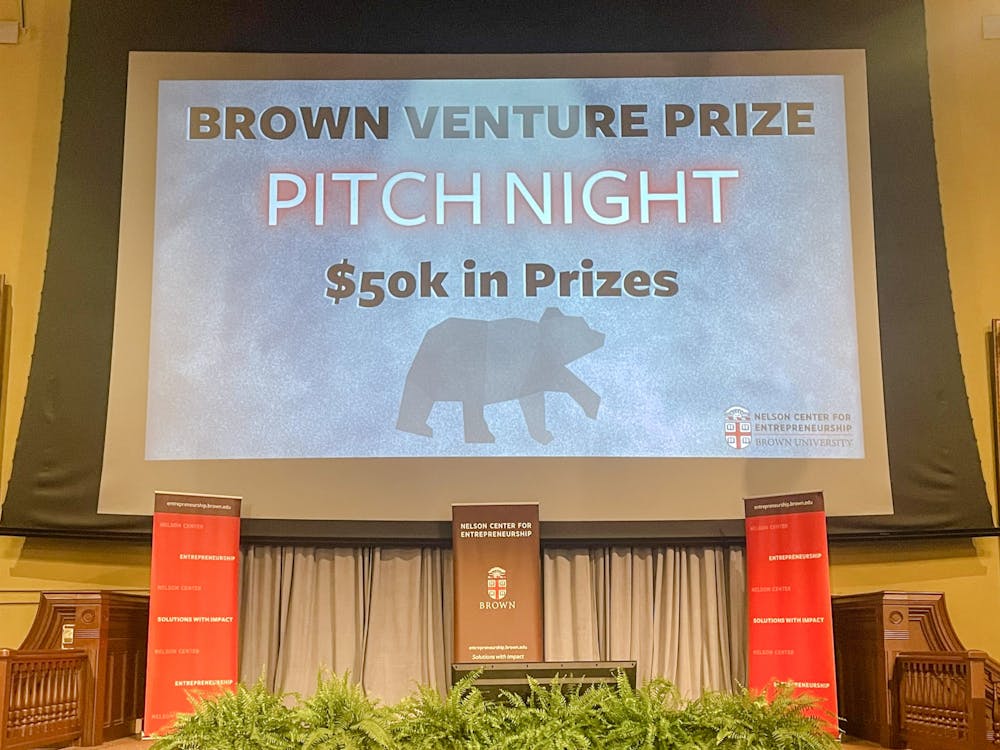Three University student startups — Elythea, Notable Narratives and Marian — were collectively awarded $50,000 in seed money at the Nelson Center for Entrepreneurship’s sixth annual Brown Venture Prize pitch competition Thursday.
A panel of seven judges — ranging from CEOs to investors — selected the three winners following a four-minute pitch and four-minute question-and-answer session for each organization. The judges also reviewed the startups’ initial applications prior to the event, according to Jonas Clark, associate director of the Nelson Center for Entrepreneurship.
Elythea, a “platform that obstetricians use in any setting to predict risk for complications of pregnancy,” according to co-founder Reetam Ganguli ’23, took home first place and a $25,000 check, the largest prize offered. Ganguli co-founded Elythea with Rishik Lad, a student at Dartmouth College and Assistant Professor of Obstetrics and Gynecology and Clinician Educator Stephen Wagner.
With maternal mortality on the rise in the United States — especially among people of color — the founders of Elythea hope that their platform will use “point-of-care variables” to improve maternal outcomes both inside and outside of the U.S., Ganguli said. In their preliminary testing, the startup has a 90% predictive accuracy rate in comparison to the 40% accuracy of their competitors, Ganguli added.
Notable Narratives took home the second-place prize of $15,000. The non-profit organization “connects first-generation low-income high schoolers to FGLI college students” for college application counseling, said co-founder Cecile Schreidah ’24 in her group’s pitch.
Brandon Avendano ’23, Notable Narratives’s other co-founder, said that a shared FGLI identity between applicants and advisors creates “values of trust.” With 1,565 FGLI applicants advised thus far, Notable Narratives hopes to use the additional funds to compensate advisors who currently provide mentorship for free, target “outreach to under-represented states” and create “a more streamlined and advanced website,” according to Avendano.
Marian, the winner of the $10,000 third-place prize, is a platform that allows users to manage their investment portfolios online using “models that know what to buy and when to sell,” said co-founder Aaron Wang ’23 during the team’s pitch. Luke Primis ’24 and Eshaan Mangat ’24 are the company’s other co-founders.
Wang referenced one specific application of their product — an interface to make a customizable algorithm that buys bitcoin when Elon Musk tweets about the cryptocurrency.
Wang said after the event that he has “no idea” what his team will do with its $10,000 prize but is “really excited and looking to democratize the active investing space.”
Other competing teams included Codex, Codified Health, EcoForm, Sessio and Uconomy. These groups promoted products ranging from sustainable material alternatives for cars to artificial intelligence applications for software developers.
The funds for the prizes were donated by Jane Katzman ’81 P’14 and Richard Katzman ’78 P’14, according to Clark. In February, “a group of esteemed judges” selected eight finalists from a pool of over 30 startups, he wrote in an email to The Herald.
Following their selection, finalists met with representatives from the Nelson Center to “practice their pitches” and “receive feedback,” Clark added. Through this process, both the groups’ pitches and how they “think about their actual ventures” improved, he wrote.
Brown Venture Prize is “different from many other competitions,” Clark wrote. “It is agnostic with respect to what sectors or industries ventures are working in.”
The prize hopes to provide students with “the potential to create impact at scale,” Clark wrote.
“It’s not every day you have the opportunity to have a group of really experienced entrepreneurs collectively dig into your venture and provide feedback,” Clark added.
According to Clark, the top three winners of the five past competitions have collectively raised over $60 million for their respective organizations. He hopes that the participants this year will use this opportunity as a “springboard to future success.”
Additional reporting by Sofia Barnett.
Correction: A previous version of this story misstated how many FGLI applicants had been advised by Notable Narratives. The Herald regrets the error.

Owen Dahlkamp is the managing editor of newsroom on The Herald's 135th Editorial Board, overseeing the paper's news operations. Hailing from San Diego, CA, he is concentrating in Political Science and Cognitive Neuroscience with an interest in data analytics. In his free time, you can find him making spreadsheets at Coffee Exchange.





